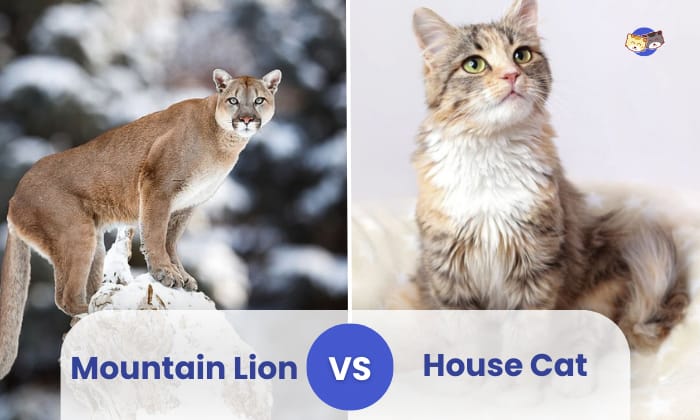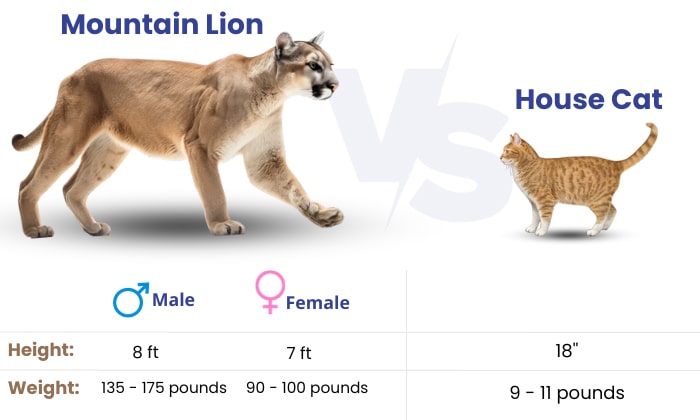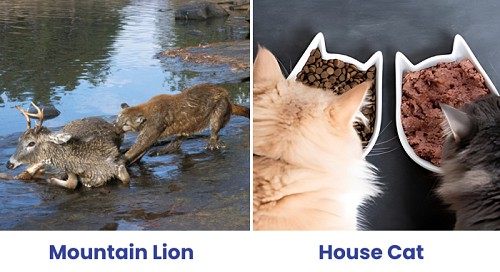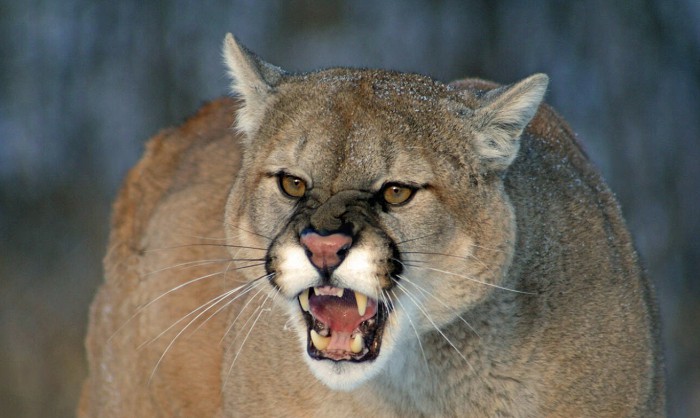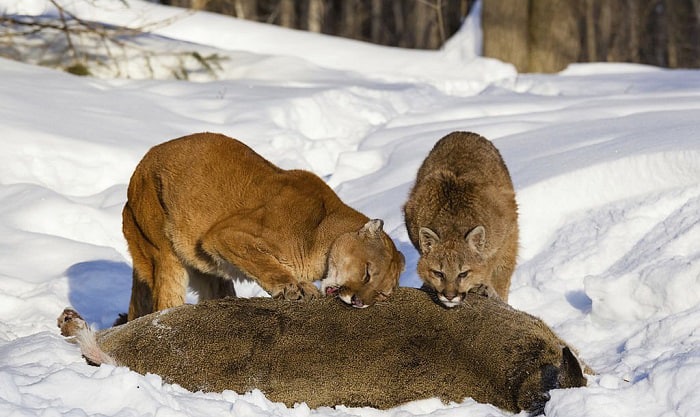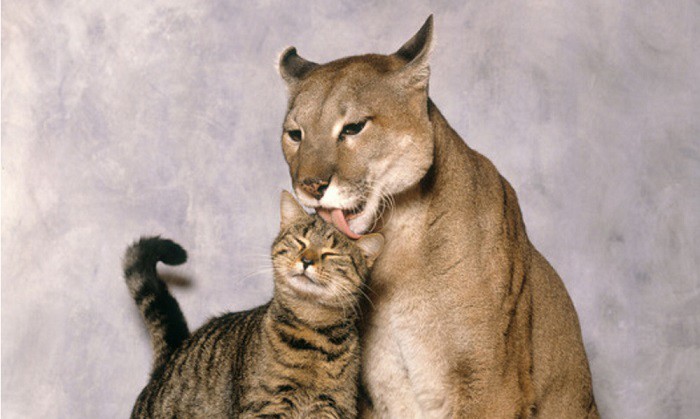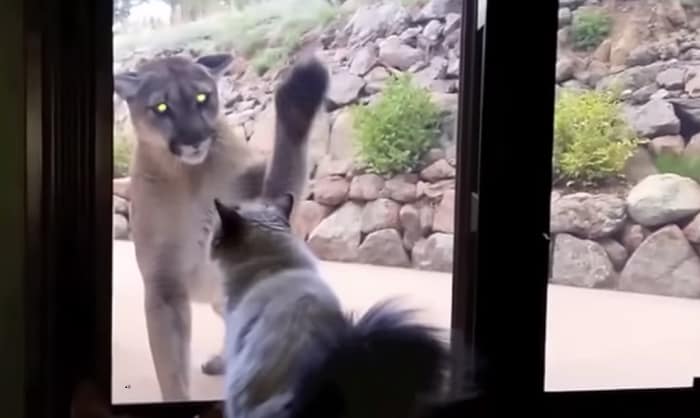We investigate the fascinating comparison between mountain lion vs home cat in the battle of the feline worlds. Despite their disparities in size and habitat, these two species share a complicated evolutionary history.
Mountain lions, feared apex predators known for their strength and stealth, live in the wild. Despite their tiny size, domesticated house cats retain primal survival instincts, allowing them to flourish in various circumstances.
Do these disparities result in clashes? Do mountain lions endanger domestic cats? This article focuses on the world of feline interactions, providing light on the dynamics between these feline animals.
To give you an insight, here’s a comparison table.
| Aspect | Mountain Lion | House Cat |
| Size | More than 8 feet (male); more than 7 feet (female) | About 18 inches |
| weight | male: 135 – 175 pounds
female: 90 – 100 pounds |
9 – 11 pounds |
| Diet | Pure meat | Wet food and dry food |
| Behavior | Stealthy predators | Playful and loves socializing |
| Habitat | Mountains or canyons | Lives with human |
| Conservation Status | Near threatened, but not endangered | Not threatened, but have population worldwide |
Table of Contents
Mountain Lions and House Cats
Mountain lions, dangerous predators of the wild, will be compared to house cats, our domestic pets, in this part, emphasizing size, diet, behavior, habitat, and conservation status.
1. Size
Mountain lions and house cats are vastly different in terms of size. Adult male mountain lion size grow to be more than 8 feet long, while female mountain lions can grow to be more than 7 feet long.
Compared to the normal house cat, which stands at only 18 inches, these gorgeous huge lions are definitely massive. This large size difference highlights the enormous morphological disparity between the two species.
Furthermore, a mountain lion can weigh 10 times more than a house cat, since it’s a majestic creature.
2. Diet
When it comes to food, mountain lions and house cats have a lot in common. Mountain lions are obligate carnivores, meaning they only eat the meat of their prey, which can include deer, rodents, and other species.
House cats, on the other hand, have adapted to a more diversified diet in household situations. They normally eat a combination of wet and dry cat food, which provides vital nutrients for their health.
3. Behavior
Mountain lions and house cats exhibit stark behavioral differences. Mountain lions are solitary and elusive apex predators recognized for their stealth. They are skilled in stalking with minimal sound and hunting their prey with precision, frequently in the dark.
House cats, on the other hand, are more friendly and playful. They build relationships with humans and other cats via various forms of play and interaction. Their domestication has bred a distinct blend of independence and camaraderie in them, making them valued home members.
4. Habitat
Mountain lions and domestic cats have quite distinct habitats. Mountain lions, as the name implies, are mostly found in mountainous locations, canyons, and wilderness places. They inhabit the wilds, typically in remote and difficult terrain.
House cats, on the other hand, have found a unique way to coexist with people. They have evolved to life within the constraints of human houses and urban areas, where they can enjoy the comforts and food given by their human partners.
5. Conservation Status
Mountain lions and domestic cats have quite different conservation statuses. Mountain lions are classified as “near threatened,” meaning that while their populations face dangers, they are not considered endangered. This classification reflects regional worries about habitat loss and human conflict.
House cats, on the other hand, are not considered threatened as a species due to their widespread distribution. However, their popularity as domestic pets, as well as their possible impact on native fauna in some locations, have sparked worries about their environmental impact.
What is a Mountain Lion?
A mountain lion, also known scientifically as Puma concolor, is a fearsome big cat native to the Americas. They are recognized for their size, agility, and solitary nature and are also known as cougars, pumas, or panthers.
Mountain lion strength is legendary, enabling these apex predators to dominate their wilderness habitats, preying on various wildlife species, and helping to maintain ecosystem equilibrium.
Why Are These Animals So Dangerous and Fierce?
Mountain lions are known for their ferocity due to their exceptional predatory abilities. They are formidable hunters due to their huge size, sharp claws, and powerful jaws.
They stalk their prey with precision, being stealthy and elusive. Because of their morphological characteristics and hunting abilities.
Can Cats Survive Encounters With Mountain Lion?
The survival of domestic cats in the presence of mountain lions is heavily dependent on a variety of conditions. House cats frequently lack the size and defensive qualities required to repel a mountain lion assault.
When house cat teases mountain lion, the the vast majority of such interactions harm domestic cats, highlighting the significant size and predatory prowess difference between these two feline species.
Seeing them being reckless sometimes, you might wonder, why are cats so fearless? Well, they are not. They definitely are scared in most confrontations with other big and aggressive animals. Sometimes, they act recklessly because they cannot perceive how dangerous the situation actually is. Cats are curious, but they are not fearless.
Who would win when cat faces off mountain lion? The answer is evident. Responsible pet keeping and an understanding of local animals can assist in reducing potential conflicts.
Will a Mountain Lion Attack a Cat?
Mountain lions, being apex predators, have been known to attack domestic cats in specific circumstances. These attacks are usually carried out when a mountain lion feels frightened or hungry.
House cats, due to their smaller size and domestication, are frequently seen as potential food by mountain lions rather than competitors. Attacks are more common in areas where mountain lions share habitat with human populations, increasing the likelihood of contact.
While such attacks are uncommon, they can be heartbreaking for pet owners. To reduce these risks, residents in mountain lion habitats must keep their cats indoors, especially during dawn and nightfall, when these big cats are most active. Knowledge of local wildlife behavior can help safeguard domestic cat vs mountain lion.
Indeed, sometimes, their interactions are kind of funny, esepcialy when the cat knows it’s safe:
Conclusion
Mountain lion vs house cat provides an enthralling contrast between two feline species that have a similar ancestor but have evolved to lead different lives. From size and diet to behavior, habitat, and conservation status, these characteristics highlight their distinct roles in the natural world and in our homes.
Mountain lions are powerful apex predators in the wild, yet house cats have evolved to become beloved pets.Understanding these contrasts not only broadens our understanding of these amazing creatures, but it also informs responsible pet ownership and wildlife conservation activities.

I am Amy Sawy, a Doctor of Veterinary Medicine (DVM) graduate from the University of Kansas. y husband, Dr. Plummer, and I own a veterinary clinic in Phillipsburg, Kansas. In addition to my professional background, I am a devoted pet owner myself, with a household that includes dogs, rodents, and most notably, cats – a total of five felines in my home.
In 2020, I joined an organization as a professional writer, leveraging my experience and collaborating with my team to deliver the most valuable information for your cat’s care.


